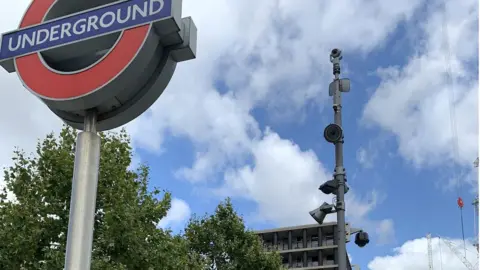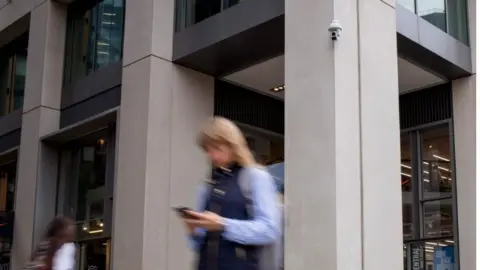King's Cross investor seeks facial recognition answers
 BBC
BBCA key investor in London's King's Cross development has told the BBC that it is trying to find out more detail about how facial recognition is being used in the area.
The BT Pension Scheme (BTPS) bankrolled the site alongside an Australian fund, which owns a majority stake.
It follows the UK's data protection watchdog and the mayor of London in seeking more information from the zone's developer Argent.
The BBC has asked Argent for comment.
"We are looking into the reported use of facial recognition at King's Cross and take this issue very seriously," a statement issued by Hermes Investment Management, on behalf of BTPS, said.
"We are working closely with Argent to fully understand the extent and use of this technology."
Telecoms firm BT has its own surveillance solutions division, but a spokesman for the company said it was not involved in the development.
Sensitive data
The Financial Times was first to report that a live-scanning face ID system was being used at the 67-acre (0.3 sq km) site around King's Cross station.
The land is privately-owned, but much of it is open to the public and is a popular thoroughfare. It is home to Google, Samsung and Central Saint Martins college as well as several shops, schools and child-focused leisure activities.
Argent told the BBC last Monday that the technology was being used to "ensure public safety" and was one of "a number of detection and tracking methods" being operated. However, it declined to share more details about either the technology, or how it had sourced a database of people's facial features.
Use of the technology is governed in the EU by the General Data Protection Regulation (GDPR) law, which came into effect in 2018.
It classes face images and biometric information derived from them as being "sensitive data" that can only be used in certain circumstances.
 Getty Images
Getty ImagesPrivacy campaigners have raised concerns, with Big Brother Watch claiming that "facial recognition surveillance risks making privacy in Britain extinct".
The House of Commons Science and Technology committee also recently published a report raising its own concerns about the spread of live facial recognition tech, which analyses images as they are captured.
Some residents have, however, commended the initiative.
Allow X content?
Job advert
The BBC has made other attempts to find out more about the facial recognition scheme.
On Thursday, the US-based security firm Allied Universal was asked for any information it could provide, after it published an advert for a CCTV operator.
Among the duties listed were: "To oversee and monitor the health, safety and welfare of all officers across the King's Cross Estate using CCTV, Face watch and surveillance tactics."
It has since amended the advert to remove references to facial recognition or surveillance.
"We are aware of the current debate surrounding the use of facial recognition technology in shopping centres, museums, conference centres and other public spaces around the UK," a spokeswoman told the BBC
"Allied Universal does not provide this type of technology to our clients.
"What we do offer is manned guarding services, risk advisory, event security and highly advanced technology solutions such as electronic access control, video monitoring and response centre and an AI-driven security workforce management platform designed to improve safety and reduce risk."
The BBC also contacted Facewatch, a firm that provides facial recognition security systems to shops, but it said it was not currently active on the site.
"Our project with King's Cross ended nearly three years ago," chief executive Nick Fisher explained.
"We worked on a project relating to crime reporting. We did not deploy or use any facial recognition technology in this project or work with Argent.
"We turned the Facewatch platform they are referring to off in April 2018, so I've no idea why they included [it] in the job description."
Football facials
There have also been related developments elsewhere.
The Sunday Times reported that Premier League team Manchester City had partnered with Texas-based Blink Identity to trial a system that would used facial ID checks to reveal whether fans had bought tickets.
It said the tech could help tackle the practice of ticket swapping. But the human rights group Liberty has said the club should avoid "normalising a mass surveillance tool".
However, the Guardian is reporting a source at the club saying that the reports "were premature and there was no such plan in place".
Allow X content?
In addition:
- the Meadowhall shopping centre in Sheffield said it had stopped using facial-recognition cameras and deleted all related data after a "short trial", but has not ruled out deploying them again in the future
- the Democratic presidential candidate Senator Bernie Sanders has called for a ban on the use of facial recognition software for policing in the US
- Amazon has said that its Rekognition face-detection system can now identify when subjects are experiencing fear, and has also improved its ability to predict people's age
